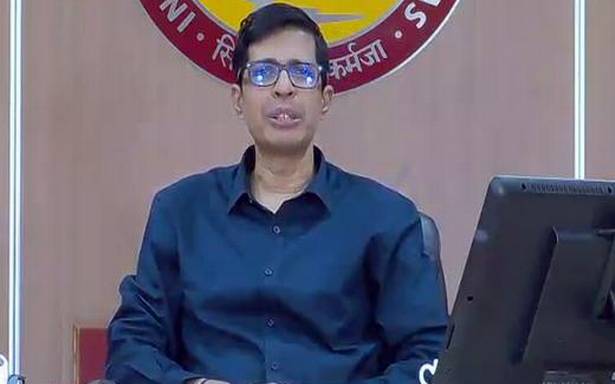V. Kamakoti, IIT Madras’s new director, is following in his family’s footsteps diligently
V. Kamakoti, who recently took over as the director of the Indian Institute of Technology Madras, is a true-blue Chennai lad. In this interaction, he explains his focus areas for the institute.
He did his schooling in Vidhya Bharathi, run by veteran activist Jaya Araunachalam, and completed higher secondary education from P.S. Senior Secondary School.
With an undergraduate engineering degree from Venkateshwara College of Engineering, he entered IIT Madras for MS and Ph.D. He has done a couple of postdoctoral research ventures at the Indian Institute of Science, Bengaluru, and the Institute of Mathematical Science, Chennai.
A violinist, who learnt the art from C.N. Chandrasekaran, the CSE professor, had in his introductory note to the media, focussed on reaching out to schoolchildren. He wants to strengthen the school curriculum and increase interaction with young students.
A mentor of two rural schools, he harbours a dream of seeing a child from his school ace the JEE, join his department and do a project with him. He was elated when on the day he was selected (as director), news came from his home village that a girl student from his school had cleared NEET.
His family has been steeped in teaching for several generations. His father retired as the head of the Sanskrit Department in the University of Madras.
“My great grandfather started a school in 1914 in Vishnupuram near Kumbakonam. At that time, 15 of 17 villages did not have a school. We now have around 800 children studying in the (government-aided George Higher Secondary School),” he said.
In the 1950s, his wife’s grandfather had started the Sri Krishna High School in Thappalampuliyur, near Tiruvarur, where currently 600 children from underprivileged families are enrolled.
At an annual day in his school, he asked a tough math question not expecting anyone to answer. To his surprise, a boy gave the right answer.
“At his age, I may not have given the answer. Some are blessed. There are geniuses like Ramanujan out there,” he said, adding: “The point is out-of-the-box thinking is very important. We have not tapped into the intelligence in rural India so far. If these kids are given an opportunity, they will do very well. A child, if taught to think in a different way at a very early stage, will make a big difference in life.”
The institute has commenced a course on out-of-the-box thinking for all everyone above the age of 10.
“This is the first step that will bring out intelligence,” he said.
Mr. Kamakoti plans to set up rural technology laboratories for children to experiment with their ideas. Such interventions will enable children be productive human beings, making them successful.
“Success is measured by the way you think, the vision you have. This should be kindled at a very early age,” he added.
On regenerative agriculture
He lost two close cousins, who were teetotallers, to cancer, and it motivated him to take up organic agricultural practice.
Mr. Kamakoti practises organic farming in a small patch of farm at his home village.
With many of the institute’s alumni returning to set up farms, he believes his dream to scale up would be realised.
“Regenerative agriculture will be an interesting problem to solve. When you want to scale it to a large number of farmers, you need technology, and I had a set of areas — health, shelter, food and education,” he said.
Ethics and AI
“As technology comes closer to life, there are a lot of things that are unexplained. Value education is something that needs to be encouraged,” Mr. Kamakoti argued, citing another of his plans.
“The Aarogya Sethu app is a marvel, but we need a balance between privacy security, and we need people who develop and use the technology to have value education,” he said.
Skill-based vocational training, emphasised by the National Education Policy 2020, would help ITI students, he said.
The premier institution is duty bound to develop a curriculum using its expertise, he said.
“There are technically challenging jobs now. Some investment to train people on the technology, and as a premier educational institution, we are duty bound to develop a curriculum,” he explained. Technology such as augmented reality and virtual reality, could be used to train students meticulously before sending them to factories, he added.
Source: Read Full Article

